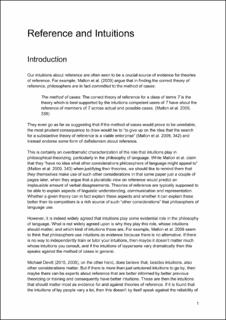Reference and Intuitions
Chapter
Accepted version

Åpne
Permanent lenke
https://hdl.handle.net/11250/2738228Utgivelsesdato
2021Metadata
Vis full innførselSamlinger
Originalversjon
10.4324/9781003111894Sammendrag
Our intuitions about reference are often seen to be a crucial source of evidence for theories of reference. This chapter contrasts two views about the relationship between individual competence and facts about reference. The meta-externalist view, the two may be quite independent; on the meta-internalist view, by contrast, facts about reference are determined by individual psychological facts. The chapter explores how, from a meta-externalist point of view, the relationship between intuitions and reference would look. Both internalism/externalism distinctions can be illustrated in terms of what is or is not possible about internal duplicates. Meta-externalism denies that the (narrow) psychological states of a speaker determine which theory of reference is true of the expressions used by that speaker: external factors also play a role in determining this. The chapter looks at some candidates for what these external factors could be and discusses in what way intuitions still might play a role in investigating which theory of reference is correct.